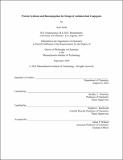Protein Synthesis and Bioconjugation for Design of Antimicrobial Conjugates
Author(s)
Saebi, Azin
DownloadThesis PDF (36.30Mb)
Advisor
Pentelute, Bradley L.
Buchwald, Stephen L.
Terms of use
Metadata
Show full item recordAbstract
New antimicrobial approaches are needed to combat the threat of antibiotic resistance. Gram- negative bacteria are of significant clinical concern, in part due to their cell wall structure that restricts the transport of most antibiotics. Here we describe the development of two chemical strategies that are positioned well to expand non-traditional antibiotic approaches to breach the gram-negative cell wall, particularly in Pseudomonas aeruginosa. The first strategy, chemical synthesis of proteins, enables access to proteins equipped with modifications and conjugation handles that are valuable for unlocking their therapeutic potential. We used this approach to produce a synthetic antipseudomonal bacteriocin and demonstrated that its physical and biological characteristics were comparable to its biological counterpart. The second strategy, protein-protein conjugation, is a powerful approach for the development of targeted antibiotics. We developed a protein-protein conjugation method based on Pd-mediated cross-coupling chemistry to perform conjugation reactions under mild and dilute conditions that are amenable to most proteins. Together, these strategies have the potential to generate new and non-traditional antibiotics.
Date issued
2022-09Department
Massachusetts Institute of Technology. Department of ChemistryPublisher
Massachusetts Institute of Technology